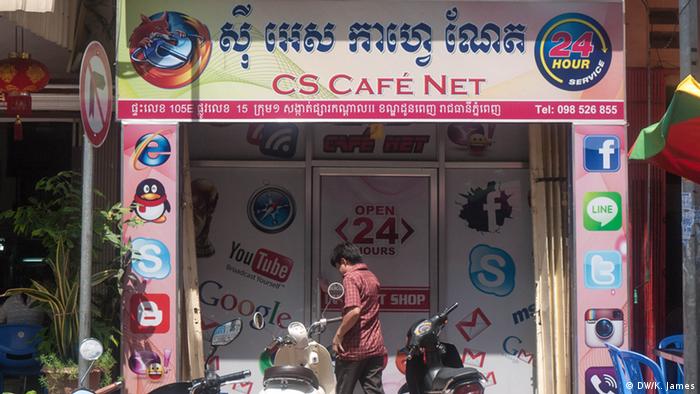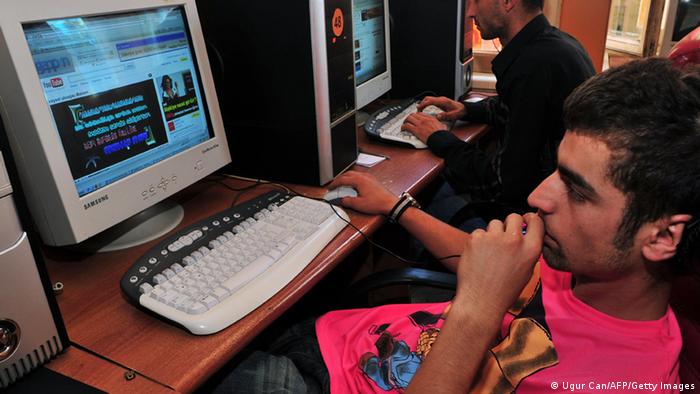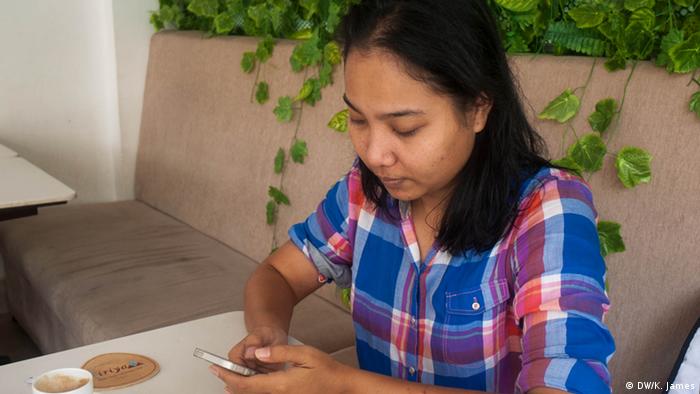Cambodian media is dominated by pro-government outlets and it can be difficult to hear critical voices, except online. But a proposed law could undermine that bastion of free expression.
TV news viewers in Cambodia are fed a steady diet of praise for the government and top officials. Whether they're giving speeches that go on for hours, cutting a ribbon at a new development project, or shaking hands with foreign dignitaries, government leaders are presented only in the best possible light.
News of a less positive nature – corruption, illegal land grabs, forced evictions, and violent police crackdowns on peaceful demonstrators – rarely makes the evening broadcast, the radio bulletin or the pages of the national Khmer-language newspapers.
Turning to Facebook and Youtube
But over the past few years, Cambodians have been looking to a new information source for their news: the Internet. Young people in particular have flocked to social media sites to share news, videos and pictures, and learn about the events in their country that the government would rather keep under wraps.
"In Cambodia, if there's a big demonstration, we can see the news online," said Proeuy Kieng, a 19-year-old who frequents an internet café in Phnom Penh to check his Facebook feed. This kind of news that TV stations ignore is especially important for him because his own family is facing eviction at the hands of powerful businesspeople, a common occurrence these days.
But Proeuy's Facebook page might be much tamer in the future if a cybercrime bill is signed into law. The draft legislation, which was leaked last month to the London-based free expression group Article 19, has provisions that could penalize a wide range of online speech and slam shut one of the few windows Cambodians have to unfiltered, uncensored news.
Especially worrying is Article 28 of the bill, which contains provisions that many fear would have a chilling effect on online speech. The law would make communications that "incite" the general population or "generate anarchy" punishable by one to three years in jail and a fine of up to nearly $1,500, about 15 times the average monthly salary in the country. Content that "generate[s] insecurity, instability" or threatens "political cohesiveness" would also be criminal, as would posts that slander or "undermine the integrity" of the government or hurt "family values."
"The law is vague and it challenges and criminalizes legitimate forms of online expression," said David Diaz-Jogeix, director of programs for Article 19.
Few restrictions until now
The Cambodian government has largely maintained a hands-off approach to online communications, unlike its neighbor Vietnam, which heavily censors the internet and imprisons bloggers who post critical content.
In late 2012, Cambodia's government ordered all internet cafés within a 500-meter radius of schools in Phnom Penh to be relocated or shut down, a move which would have removed all internet cafés from most of the central city. But after an outcry from rights groups and online, the order was rescinded.
In fact, the 2013 Freedom of the Net study of internet freedom by Freedom House described Cambodia as "partly free," ranking it higher than Thailand, Vietnam or Myanmar.
This draft of a cybercrime law was also announced in 2012, but in keeping with a common practice of the government, it was done in secret and without any outside consultations.
Growing government worries
Several observers say that the new concern about online communication comes from the threat it poses to the government's near monopoly on information. In the past, the Internet wasn't thought to have much reach or influence. Cambodia is a poor country, and 80 percent of people live in the countryside; many don't have electricity. But cheap smart phones, increased 3G coverage and an explosion of the number of Facebook users changed all that, to the government's dismay.
"For the past two years, activities online have, I think, taken them by surprise," said Kounila Keo, one of Cambodia's best-known bloggers.
The tipping point could well have been national elections last July, when the opposition made substantial gains against the ruling CPP party, which has held an iron lock on power for decades.
The voter revolt coincided with an unprecedented use of social media by young people who used their growing online presence to organize, mobilize voters and criticize CPP leaders.
"So the internet seemed to benefit the opposition a lot and ruling party seemed unable to catch up," Keo said. The cybercrime law could be an attempt to stifle this new, free flow of information, observers say.
Not quite NSA level
People who work at human rights organizations and in the media still enjoy freedom online, and anonymity if they want to. But that's due to Cambodia's own technical limitations.
"A lot of experts believe the government doesn't have that capacity - yet - to reveal who they are online," Keo said. "But in the future there might be other technology that the government buys from other governments in order to use on its own people."
Such cooperation is already happening. In late April, two Cambodian hackers belonging to collective Anonymous were arrested in Phnom Penh on charges of hacking several government websites and stealing sensitive information. According to local media reports, the two 21-year-old IT students were apprehended following a months-long investigation by Cambodian authorities with the help of the FBI.
"As far as I know, there is a Cambodian group that already monitors communications online," said Chak Sopheap, executive director of the Cambodian Center for Human Rights. "It's not systematic, but it is going on."
Increase data security and protect free speech
Her group is calling on the authorities to hold open consultations on the draft law with NGOs and IT experts before making it into law. But public input has never been a priority for officials here. Repeated calls and emails to government ministries for comment on this story went unanswered.
Chak is not against a cyberlaw to protect against abuses online, such as the spread of child pornography or increasing data security. She also said, however, that any legislation should protect the interests of the public and, at the same time, guarantee freedom of expression.
"But clearly, this law is meant to crack down on critical voices," Chak said.




2 comments:
You are wrong on this: "A lot of experts believe the government doesn't have that capacity - yet - to reveal who they are online," Keo said. "But in the future there might be other technology that the government buys from other governments in order to use on its own people."
I can send you IP addresses, ISP name & contact, accessed date & times; all you have to do is to get the ISP customers log in file from the ISP then you can tell who's who.
Post a Comment